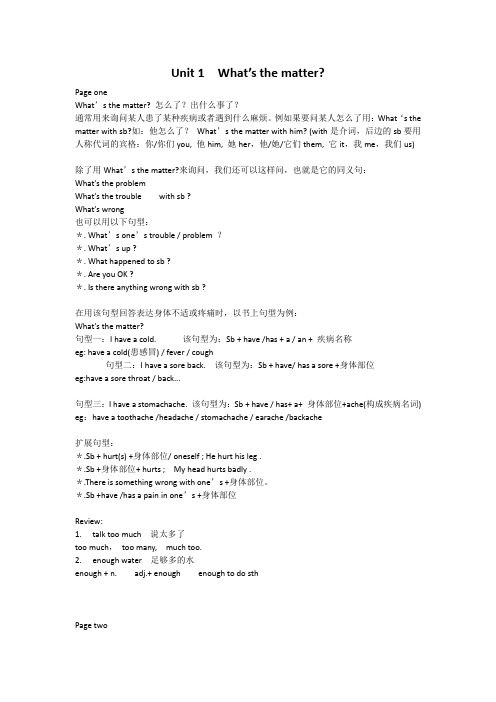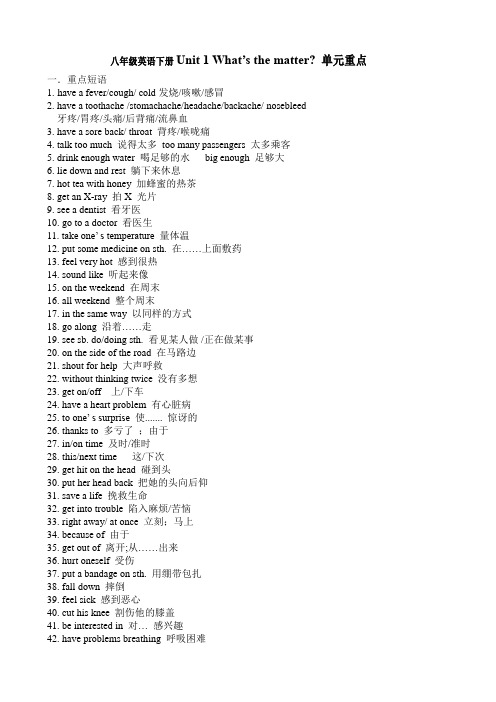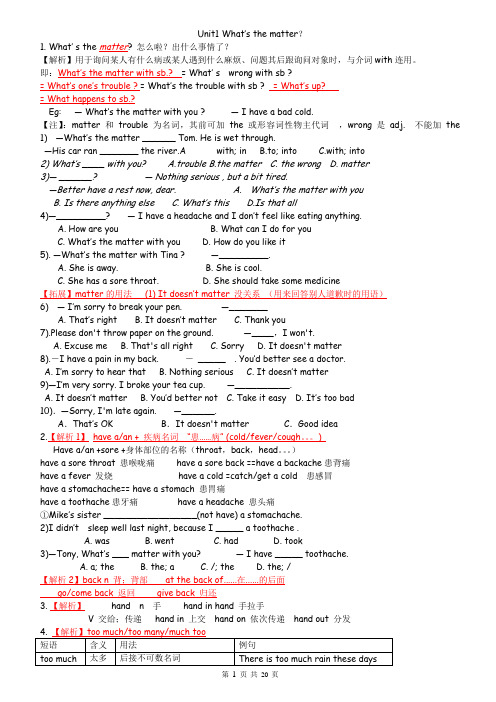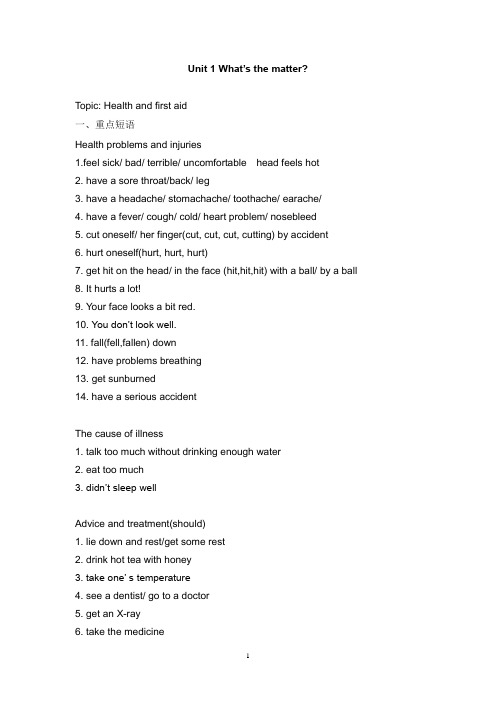八年级英语下册Unit1What’sthematter短语语法知识点汇总
人教版初二(下)英语unit1 what's the matter知识点讲解与练习

八年级下册英语Unit 1 what’s the matter?词汇篇学生通过本讲学习,能够掌握本单元的重点词汇句型,并在综合能力上有一定的拓展。
1.matter的用法(1)名词:事情,问题What’s the matter? =what’s wrong (with you)? =what’s the trouble怎么啦?出什么事啦?(2)动词:有重大影响,有重要性如:What does it matter?2.疾病的表达法have a cold/a fever/ a toothache/ a stomachache3.take 的固定搭配take one’s temperature/ take breaks/ take risks/take some medicine/take off/ take care of/take away 4.surprise的用法1.做名词:to one’s surprise 使。
惊讶的,出乎。
意料2.做动词:surprise sb使某人吃惊3.做形容词:surprising, surprised的用法5.get的用法get off下车/get on上车/get into陷入,参与6.be used to sth/doing sth 习惯于做某事be used to do sth 被用作去做某事used to do sth 习惯于做某事7.out of的固定搭配look out of 向。
外看/ get out of从。
出来/ run out of用光基础演练1.---What’s wrong ______you?---I fell off the bike and hurt my leg.A. ofB. withC. forD. by2.Tom and Jenny enjoyed _________playing computer games.A. himselfB. herselfC. ourselvesD. themselves3. Sally became interested ___________science and wanted to be a scientist.A. forB. inC. throughD. at4. ---I had a __________.---You’d better go to see a dentist.A. headacheB. feverC. coldD. toothache5. I didn’t _________my temperature, but I knew I had a fever.A. giveB. setC. takeD. show二、根据汉语意思翻译句子。
人教版八年级英语下册 Unit 1 What’s the matter?知识点复习

人教版英语八年级下册第一单元知识点过关Unit 1 What’s the matter?一、重点短语1. have a fever 发烧,具体运用:She has a fever and she should lie down and rest.2. have a cough 咳嗽,cough既可以作名词,也可以作动词3. have a toothache 牙疼;tooth牙齿+ ache疼痛toothache 牙痛4. talk too much 说得太多;类似短语:eat too much吃太多5. drink enough water 喝足够的水;take enough money带够钱6. have a cold 受凉、感冒;也可以用catch a cold7. have a stomachache 胃疼;stomach胃+ache疼痛stomachache 胃疼8. have a sore back 背疼;sore疼痛+back背sore back背疼9. have a sore throat 喉咙痛10. lie down and rest 躺下休息11. hot tea with honey 加蜂蜜的热茶;with表示“带有”12. see a dentist 看牙医;看医生用“see”13. get an X-ray 拍X 光片14. take one’ s temperature 量体温;量体温、服药都用“take”15. put some medicine on sth. 在……上面敷药;例如:put some medicine on the cut在切口处敷药16. feel very hot 感到很热;feel感官动词,后接形容词17. sound like 听起来像;例如:sounds like a good idea 听起来像个好主意18. all weekend 整个周末;类似短语:all day \ all night \ all month19. in the same way 以同样的方式20. go to a doctor 看医生21. go along 沿着……走;类似短语:walk along22. on the side of the road 在马路边23. shout for help 大声呼救24. without thinking twice 没有多想;without是介词,后接动词ing形式25. get off 下车;反义词get on上车26. have a heart problem 患有心脏病27. to one’ s surprise 使....... 惊讶的;例如:to my surprise \ to his surprise28. thanks to 多亏了、由于;例如:Thanks to the the doctors , the patient was saved in time. 多亏了医生们,这个病人及时被救了。
八下Unit-1-What's-the-matter知识点归纳

八下Unit 1 What’s the matter?一.询问某人患了何种疾病或遇到什么麻烦时,常用以下句型:1.What’s the matter (with sb)?2. What’s the trouble / problem(with sb)?3.What’s wrong (with sb)? 你怎么了?4. What’s one’s trouble / problem ?5.What’s up ?6. What happened to sb ?7.Are you OK ? 8. Is there anything wrong with sb ? 二.表达身体不适或疼痛时,常用以下结构:1.Sb + have /has + a / an + 疾病名称:have a cold(患感冒) / fever / cough / temperature注:have a cold相当于get a cold/catch a cold/have got a cold;have a bad cold(患重感冒);have a heart problem 有心脏病2.Sb + have/ has a sore +身体部位:have a sore throat / back3.Sb + have / has+ a+ 身体部位+ache(构成疾病名词) have a toothache /headache / stomachache / earache /backache4.Sb + hurt(s) +身体部位/ oneself ; He hurt his leg .或身体部位+ hurts ; My head hurts badly .5.There is something wrong with one’s +身体部位。
6.Sb +have /has a pain in one’s +身体部位三.情态动词 should / should’t 的用法:意为’应该,应当’后接动词原形,无人称和数的变化。
八年级英语下册1·2单元知识点汇总

Unit 1 What’s the matter?一、基础知识1.What’s the matter? 怎么啦?出什么事情了?【解析】matter/ ' mætə(r)) /n.问题;事情What’s the matter with you?= What’s the trouble with you? = What’s wrong with you?你怎么了?【注】:matter 和trouble 为名词,其前可加the 或形容词性物主代词,wrong 是adj. 不能加the【用法】用于询问某人有什么病或某人遇到什么麻烦、问题其后跟询问对象时,与介词with 连用。
即:What’s the matter with sb.? = What’s your trouble?= What’s up? = What happens to sb.?—What’s the matter with you ? —I have a bad cold.2.I had a cold.我感冒了。
have a cold=catch a cold=have the flu感冒have a fever 发烧have a cough咳嗽have a stomachache胃疼,肚子疼have a toothache牙疼have a headache头疼3.身体部位+ache(疼痛)构成新的复合词stomach+ache=stomachachehead+ache=headachetooth+ache=toothacheback+ache=backache后背痛4.much too+ 形容词,意为太...... ,too much+名词,意为很多,大量。
5.enough【形容、副词】足够的/地,enough放在名前后,形副后。
good enough足够好enough money=much money6.lie down躺下,lie 躺,躺着,过去式lay;lie说谎,过去式lied7.maybe ―或许‖,常用于句首,表示可能性,后加句子。
八下英语语法归纳

八下英语语法归纳Prepared on 21 November 2021新版八年级英语下册第一单元知识点归纳Unit 1 What’s the matter一、基础知识1. What’ s the matter 怎么啦出什么事情了【解析】matter/ ' mt(r)) /n.问题;事情What’ s the matter with you= What’s the trouble with you = What’ s wrong with you 你怎么了【注】: matter 和trouble 为名词,其前可加the 或形容词性物主代词,wrong 是adj. 不能加the【用法】用于询问某人有什么病或某人遇到什么麻烦、问题其后跟询问对象时,与介词with连用。
即:What’s the matter with sb. = What’s your trouble = What’s up = What happens to sb.—What’s the matter with you —I have a bad cold.2. I had a cold.我感冒了。
have a cold=catch a cold=have theflu感冒have a fever 发烧 have a cough咳嗽 have a stomachache胃疼,肚子疼 have a toothache牙疼 have a headache头疼3. 身体部位+ache(疼痛)构成新的复合词stomach+ache=stomachache head+ache=headachetooth+ache=toothache back+ache=backache后背痛4. much too+ 形容词,意为太...... ,too much+名词,意为很多,大量。
5. enough【形容、副词】足够的/地,enough放在名前后,形副后。
八年级下unit1what's the matter单元知识总结

Section A1. What’ s the matter? 怎么啦?出什么事情了?【解析】matter n.问题;事情What’ s the matter with you? = What’s the trouble with you? = What’ s wrong with you?【注】:matter 和trouble 为名词,其前可加the 或形容词性物主代词,wrong 是adj. 不能加the【用法】用于询问某人有什么病或某人遇到什么麻烦、问题其后跟询问对象时,与介词with连用。
即:What’s the matter with sb.? = What’s your trouble? = What’s up? = What happen ed to sb.?【拓展】matter的用法(1) It doesn’t matter 没关系(用来回答别人道歉时的用语)( ) —I’m sorry to break your pen. —_______ A. That’s right B. It doesn’t matter C. Thank you(2) as a matter of fact= in fact 事实上, 实际上2. I have a cold 我感冒了I have a stomachache 我患胃痛I have a sore back. 我背痛。
【解析】have a cold 受凉;感冒have a/an + 疾病名词―患……病‖ (cold/fever/cough)have a sore throat 患喉咙痛have a sore back 患背痛have a fever 发烧have a cold =catch a cold 患感冒have a stomachache 患胃痛have a toothache患牙痛have a headache 患头痛have a backache患背痛①Mike’s sister _________________(not have) a stomachache.3.hand n 手hand in hand 手拉手V 交给;传递hand in 上交hand on 依次传递hand out 分发A .much too; too muchB .too many; much too C. too much; too much D. too much ;much too5. drink some hot tea with honey. 喝一些加蜂蜜的热茶。
八年级英语下册Unit1What’sthematter短语语法知识点汇总(新版)人教新目标版

Unit 1 What’s the matter一、必背短语Section A 部分have a cold have a stomachachehave a sore throat have a sore backlie down and rest take one’s temperaturetalk too much take breaks/a breakget off get an X-ray11.看见某人正在做.. see sb. doing think twiceexpect sb. to do 14.使…惊讶的to one’s surpriseagree to do sth. in time17.多亏,由于thanks to 18.陷入困境;惹麻烦get into troubleSection B 部分rest for a few days …放下;低下p ut…downtell sb. to do tell sb. not to dohave problems/trouble/difficulty (in) doing sth…感兴趣be interested in be used to doing sthused to do sth take risks/a risk10.由于/因为+n./pron. because of in a dangerous situationin a difficult13.用尽,耗光run out (of)situationbe ready to do cut off…以至于…s o…that…17.以便于;为了so that/in order that【教材内容解析】Section A1.What’s the matter? (P. 1)What’s the matter意为“怎么了?出什么事了?”,常用来询问对方遇到什么麻烦或者有什么不顺心的事,后接with sb./sth.表示“某人/某物怎么了”。
unit1What's -the-matter-知识点及短语

Unit 1 What’s the matter?Page oneWhat’s the matter? 怎么了?出什么事了?通常用来询问某人患了某种疾病或者遇到什么麻烦。
例如果要问某人怎么了用:What‘s the matter with sb?如:他怎么了?What’s the matter with him? (with是介词,后边的sb要用人称代词的宾格:你/你们you, 他him, 她her,他/她/它们them, 它it,我me,我们us)除了用What’s the matter?来询问,我们还可以这样问,也就是它的同义句:What’s the problemWhat’s the trouble with sb ?What’s wrong也可以用以下句型:*. What’s one’s trouble / problem ?*. What’s up ?*. What happened to sb ?*. Are you OK ?*. Is there anything wrong with sb ?在用该句型回答表达身体不适或疼痛时,以书上句型为例:What’s the matter?句型一:I have a cold. 该句型为:Sb + have /has + a / an + 疾病名称eg: have a cold(患感冒) / fever / cough句型二:I have a sore back. 该句型为:Sb + have/ has a sore +身体部位eg:have a sore throat / back...句型三:I have a stomachache. 该句型为:Sb + have / has+ a+ 身体部位+ache(构成疾病名词) eg:have a toothache /headache / stomachache / earache /backache扩展句型:*.Sb + hurt(s) +身体部位/ oneself ; He hurt his leg .*.Sb +身体部位+ hurts ; My head hurts badly .*.There is something wrong with one’s +身体部位。
Unit1what’sthematter_SectionA知识点梳理人教版八年级英语下册

人教版八年级下册英语课本知识点梳理Unit 1 wh at’s the matter? sectionA课文内容:What's the matter? 怎么了? (教材第1页)【用法详解】What's the matter? 怎么了?/出什么事了?常用于询问某人患了何种疾病,遇到了什么困难等,也可用于询问某物出了什么故障,其后可接with sb./sth.,表示“某人/某物怎么了?”。
其中matter 用作名词,意为“问题;事情”matter前须加定冠词the。
【例句】What's the matter? 怎么了?Bad luck.I lost my pen. 真倒霉,我弄丢了钢笔.What's the matter with him? 他怎么了?He has a sore back.他背痛【拓展】matter[动词] 要紧;有关系多用在否定句、疑问句或条件句中It doesn't matter.没关系。
(通常用来回答对方的道歉)I have a cold. 我感冒了。
(教材第1页)【用法详解】have a cold (患)感冒。
其中have 用作及物动词,意为“患(病);遭受(病痛)”,常用于结构“have a/an +疾病名称”表示患病或身体某部位不舒服。
此时它不能用于进行时态,其第三人称单数形式为has,过去式为had。
常见的表示病痛的短语还有:have a fever 发烧have a toothache 牙疼have a headache头痛have a cough 咳嗽have a stomachache胃痛Do you often have a cold? 你经常感冒吗?Jim had a stomachache after supper yesterday.吉姆昨天晚饭后胃痛。
l have a stomachache.我胃痛。
( 教材第1 页)【用法详解】stomachache [名词]胃痛;腹痛是由“名词stomach(;腹部)+ache(疼痛)”构成的复合名词。
Unit1-What's-the-matter重点知识短语等

八年级英语下册Unit 1 What’s the matter?单元重点一.重点短语1.have a fever/cough/ cold发烧/咳嗽/感冒2. have a toothache /stomachache/headache/backache/ nosebleed牙疼/胃疼/头痛/后背痛/流鼻血3. have a sore back/ throat 背疼/喉咙痛4. talk too much 说得太多too many passengers 太多乘客5. drink enough water 喝足够的水big enough 足够大6. lie down and rest 躺下来休息7. hot tea with honey 加蜂蜜的热茶8. get an X-ray 拍X 光片9. see a dentist 看牙医10. go to a doctor 看医生11. take one’ s temperature 量体温12. put some medicine on sth. 在……上面敷药13. feel very hot 感到很热14. sound like 听起来像15. on the weekend 在周末16. all weekend 整个周末17. in the same way 以同样的方式18. go along 沿着……走19. see sb. do/doing sth. 看见某人做 /正在做某事20. on the side of the road 在马路边21. shout for help 大声呼救22. without thinking twice 没有多想23. get on/off 上/下车24. have a heart problem 有心脏病25. to one’ s surprise 使....... 惊讶的26. thanks to 多亏了;由于27. in/on time 及时/准时28. this/next time 这/下次29. get hit on the head 碰到头30. put her head back 把她的头向后仰31. save a life 挽救生命32. get into trouble 陷入麻烦/苦恼33. right away/ at once 立刻;马上34. because of 由于35. get out of 离开;从……出来36. hurt oneself 受伤37. put a bandage on sth. 用绷带包扎38. fall down 摔倒39. feel sick 感到恶心40. cut his knee 割伤他的膝盖41. be interested in 对…感兴趣42. have problems breathing 呼吸困难43. mountain climbing 登山运动44. be used to doing sth. 习惯做某事45. run out (of) 用完;用尽46. so that 以便47. so. . . that 如此… …以至于…48. be in control of 掌管;管理49. in a difficult situation 在闲境屮50. keep on doing sth. 继续或坚持做某事51. make a decision 做出决定52. take risks 冒险53. give up 放弃54. act quickly 快速行动二.重点句型(一) 医生询问病情的常用语句:1. What's wrong/the matter (with you)?你怎么了?What's your trouble? 你哪里不舒服?When did it start?从何时开始生病的?2. How are you (feeling) now?你现在觉得怎么样?Are you feeling better today?你今天好些了吗?3. Do you feel tired?你觉得疲劳吗?(二) 病人诉说病情的常用语句:1. I don't feel very well. / I'm not feeling well. 我感到不舒服。
八年级英语下册Unit 1 What’s the matter-重点句型短语汇总

八年级英语下册Unit 1 hat’s the atter?重点句型短语汇总八年级英语下册Unit1hat’stheatter?重点句型短语汇总Unit1hat’stheatter?一、重点短语haveafever发烧2haveaugh咳嗽3haveatthahe牙疼4taltuh说得太多drinenughater喝足够的水6haveald受凉;感冒7haveastahahe胃疼8haveasreba背疼9haveasrethrat喉咙痛0liednandrest躺下来休息1htteaithhne加蜂蜜的热茶2seeadentist看牙医3getanX-ra拍X光片4taene’steperature量体温putseediinensth在……上面敷药6feelverht感到很热7sundlie听起来像8alleeend整个周末9inthesaea以同样的方式20gtadtr看医生21galng沿着……走22nthesideftherad在马路边23shutfrhelp大声呼救24ithutthiningtie没有多想2getff下车26haveaheartprble有心脏病27tne’ssurprise使[京讶的28thanst多亏了;由于29intie及时30savealife挽救生命31getinttruble造成麻烦32rightaa立刻;马上33beausef由于34getutf离开;从……出萍3hurtneself受伤36putabandagensth用绷带包扎37falldn摔倒38feelsi感到恶心39haveansebleed流鼻血40uthisnee割伤他的膝盖41putherheadba把她的头向后仰42haveprblesbreathing呼吸困难43untainlibing登山运动44beusedtdingsth习惯做某事4runut用完;用尽46sthat以便47sthat如此……以至于…48beinntrlf掌管;管理49inadiffiultsituatin在闲境屮0eepndingsth继续或坚持做某事1aeadeisin做出决定2taeriss冒险3giveup放弃二、重点句型hat’stheatter?hat’stheatterithu?=hat’sthetrubleithu?=hat’srngithu?你怎么了?2hatshuldshed?她该怎么办呢?ShuldItaeteperature?我应该量一下体温吗?主语+shuld/shuldn’t+动词原形①ushuldliednandrest你应该躺下休息一会儿。
Unit1 what'sthematter 知识点与短语

Unit1 What’s the matter?Section A1. 你怎么啦?What’s the matter with you?= What’s your trouble?=What’s the troublewith you ?= What’s up with sb?= What’s wrong with you ?= What happened to you?【拓展】It doesn’t matter 没关系as a matter of fact= in fact事实上, 实际上2. 我背痛。
I have a sore back.=I have a backache.= I have a pain in the back.=My back hurts.3. too much太多+不可数名词或放在动词之后too many 太多+可数名词复数much too太+形容词或副词4.enough 的用法(1) 修饰名词时,可放在名词之前或之后(2) 修饰adj./adv时,放在adj./adv 后(3) enough + to do sth5.表达建议的句型:1)…should / shouldn’t do…2)…can do…3)Why not do...?4)Would …like to do…?5)Let's do...6)Shall we do…?7)What / How about doing...?8)You'd better do ...6.情态动词Must? ---…needn’t / not have toMay?---…can’t / mustn’tCould?---…can;can’tNeed?---…must7. sound like +名词(短语)听起来像…sound + adj. 听起来….【同】feel / smell / look / taste8. need v 需要(1) 做情态动词need do(2) 做实义动词need to do(3) 表被动need doing9. see sb. do sth 看见某人做某事(强调全过程)see sb. doing sth 看见某人正在做某事(强调正在发生)【同】watch / look at / hear /listen to /feel /find /…10. lie →lay →lain v 躺下,(现在分词lying ).11.24-year-old 24岁的“数词+名词+形容词”构成复合形容词,名词用单数。
人教版八年级下册Unit1Whatsthematter知识点总结和作文范文

人教版八年级下册Unit1Whatsthematter知识点总结和作文范文Unit 1 What’s the matter? 知识点总结及作文范文1.What’s the matter?+with sb询问某人怎么了,出什么事了?=What's the trouble? +with sb=What's wrong ?+with sb=What's up ?+with sb=What happened+to sb2.关于患病的表达方式1) I have a +疾病eg: I have a cold/I have a fever.2) I have a +身体部位+ache. eg: I have a headache.3) I have a sore +身体部位(throat嗓子;back后背)4) I have a pain in the +身体部位eg: I have a pain in the head.5) I have the flu.3. lie/lie/lay辨析4. at 9:00 am 在几点用介词at5. without 介词,“没有”,后面跟和介词,名词,动词的ing形式6.expect sb to do sth 期待某人做某事7.surprise v.使惊奇n.惊奇,诧异adj.令人惊讶的to one’s surprise 使…惊讶的是;出乎…的意料in surprise 惊奇地be surprised at 对…感到吃惊be surprised to do sth 惊讶地做某事be surprised + that从句吃惊/惊讶…8.agree v.同意,赞成agree to do sth; agree with sb9.反身代词10.because of:因为because of 后面接名词,代词,动词ingbecause+句子11. risk 风险,危险take risks /take a risk 冒险at the risk of 冒着…的危险at risk 处境危险12.辨别sick和ill1)sick和ill作形容词都是“生病的”意思。
八年级下Unit1 What's the matter?笔记

Unit1 What’s the matter? 知识点1.(1) be surprised to do惊讶地干某事, be surprised at sth.因某事惊讶, be surprised that 从句,(2) be used to doing sth. 习惯于干某事, used to do sth. 过去常常干某事, I’m used to getting up early and having a walk.我习惯于早起散步.(3)look forward to doing, 盼望干某事,(4)be halfway to doing半路干某事,2.(1)think about doing考虑干(2)agree to do sth.同意干某事, agree with sb同意某人. , agree on sth. 同意某事,(3)thanks to sth. 多亏,由于, Thanks to your help,(4) enjoy oneself= have fun= have a good time过得愉快,, help yourself to sth. 随便吃点…,(5)be+动词过去分词,“被…”, be saved被挽救, He was saved by the passengers.(6) expect to do期望干某事, expect sb. to do期望某人干某事,(7) An accident happened.一个事故发生了.3.(1)see sb. do看见某人做过某事, see sb. doing看见某人正在做某事, (2) on the side of the road在公路那边, on both sides of the road在公路两边, on either side of the road在公路每一边,(3) to one’s surprise令某人惊奇的是,。
2014春八年级下册unit1-what's-the-matter课文重难点讲解

Unit1 What’s the matter?1. What’ s the matter? 怎么啦?出什么事情了?【解析】用于询问某人有什么病或某人遇到什么麻烦、问题其后跟询问对象时,与介词with连用。
即:What’s the matter with sb.? = What’ s wrong with sb ?= What’s one’s trouble ? = What’s the trouble with sb ? = What’s up?= What happens to sb.?Eg: —What’s the matter with you ?— I have a bad cold.【注】:matter 和trouble 为名词,其前可加the 或形容词性物主代词,wrong 是adj. 不能加the 1) —What’s the matter ______ Tom. He is wet through.—His car ran _______ the river.A with; in B.to; into C.with; into2) What’s ____ with you? A.trouble B.the matter C. the wrong D. matter3)— ______? — Nothing serious , but a bit tired.—Better have a rest now, dear. A. What’s the matter with youB. Is there anything elseC. What’s thisD.Is that all4)—_________? —I have a headache and I don’t feel like eating anything.A. How are youB. What can I do for youC. What’s the matter with youD. How do you like it5). —What’s t he matter with Tina ? —_________.A. She is away.B. She is cool.C. She has a sore throat.D. She should take some medicine【拓展】matter的用法(1) It doesn’t matter 没关系(用来回答别人道歉时的用语)6) —I’m sorry to break your pen. —_______A. That’s rightB. It doesn’t matterC. Thank you7).Please don't throw paper on the ground. —____,I won't.A. Excuse meB. That's all rightC. SorryD. It doesn't matter8).-I have a pain in my back. -_____ . You’d better see a doctor.A. I’m sorry to hear thatB. Nothing seriousC. It doesn’t matter9)—I’m very sorry. I broke your tea cup.—__________.A. It doesn’t matterB. You’d better notC. Take it easyD. It’s too bad10).—Sorry, I'm late again. —______.A.That’s OK B.It doesn't matter C.Good idea2.【解析1】have a/an + 疾病名词“患……病” (cold/fever/cough。
人教八年级下册 Unit 1 What’s the matter 短语归纳

Unit 1 What’s the matter?1. 感冒have a cold2. 发烧have a fever3. 咳嗽have a cough4. 肚子痛have a stomachache5. 头痛have a headache6. 牙痛have a toothache7. 太多too much=too many8. 嗓子痛have a sore throat9. 背痛have a sore back10. 腿痛have a sore leg11. 躺下休息lie down and rest12. 照X光get an X-ray13. 看牙医see a dentist=go to a dentist14. 休息take breaks=take a break15. 量体温take one’s temperature16. 在周末on the weekend=on weekends17. 一直坐着sit in the same way18. 去看医生go to a doctor19. 下车get off20. 看见某人正在做某事see sb doing21. 看见某人做某事see sb do sth22. 呼喊救命shout for help23. 毫不犹豫without thinking twice24. 有心脏病have a heart problem25. 去医院go to the hospital26. 24岁的24-year-old27. 沿着走go along28. 期待某人做某事expect sb to do sth=wish sb to do29. 考虑think about30. 把某人扶上车get sb onto the bus31. 使......惊讶;出乎意料to one’s surprise32. 同意做某事agree to do33. 多亏;由于thanks to34. 及时in time35. 准时on time36. 考虑think about37. 立即;马上right away=at once38. 现在right now= now39. 刚才just now 40. 刚刚好,正好,恰哈just right41. 陷入麻烦get into trouble42. 伤到某人自己hurt oneself43. 流鼻血have a nosebleed44. 摔倒fall down45. 校医school nurse46. 擦破膝盖cut one’s knee47. 晒伤get sunburned48. 呼吸困难have problems breathing49. 撞到头get hit on the head50. 被……撞到get hit by51. 感到不舒服feel sick52. 对……感兴趣be interested in doing53. 习惯于......be used to doing=get used to doing54. 冒险take risks55. 因为because of56. 用尽;耗尽run out (of)57. 准备好做be ready to do58. 好像seem to do=seem to be59. 离开;从......中出来get out of60. 切除cut off61. 做决定make decisions=make a decision62. 以便so that63. 如此……以致so...that64. 坚持做keep on doing65. 和……一样the same as=be similar to66. 介意做mind doing67. 掌管;管理be in control of68. 放弃give up doing69. 打扫;清除干净clean up。
八年级英语下册Unit1What’sthematter知识点整合新版人教新目标版【word版】.doc

Unit 1 What’s the matter?Topic: Health and first aid一、重点短语Health problems and injuries1.feel sick/ bad/ terrible/ uncomfortable head feels hot2. have a sore throat/back/ leg3. have a headache/ stomachache/ toothache/ earache/4. have a fever/ cough/ cold/ heart problem/ nosebleed5. cut oneself/ her finger(cut, cut, cut, cutting) by accident6. hurt oneself(hurt, hurt, hurt)7. get hit on the head/ in the face (hit,hit,hit) with a ball/ by a ball8. It hurts a lot!9. Your face looks a bit red.10. You don’t look well.11. fall(fell,fallen) down12. have problems breathing13. get sunburned14. have a serious accidentThe cause of illness1. talk too much without drinking enough water2. eat too much3. didn’t sleep wellAdvice and treatment(should)1. lie down and rest/get some rest2. drink hot tea with honey3. take one’ s temperature4. see a dentist/ go to a doctor5. get an X-ray6. take the medicine7. wash the cut and put some medicine on it/ put a bandage on it8. press the sides of the noseOthers1. the other day2. an all-you-can-eat meal3. at first4. take good care of5. all weekend6. take breaks/ a break away from the computer7. sit in the same way for too long without moving( sit,sat, sat, sitting)8. on the side of the road9. shout for help10. without thinking twice11. get off/on12. act quickly13. most of the passengers14. wait for the next bus15. to one’s surprise16. move the man onto the bus17. thanks to18. get into trouble19. save a life20. right away21. in time22. help others23. hurt oneself playing soccer25. a few days26. as a mountain climber27. be interested in28. take risks29. in a vey dangerous situation30. by oneself31. run out (of)32.cut off half his right arm33. lose too much blood(lose-lose-lost)34. a book called Between a Rock and a Hard Place35.the importance of36. make good decisions37.in control of38. the love for39. the same spirit40.because of41. give up二、重点句型1. see sb doing sth/ do sth2. expect sb to do sth3. agree to do sth4. think about doing sth5. tell sb. To do sth (tell, told, told)6. be used to doing sthused to do sthbe used to do sth7. be ready to do sth/for sth8. keep on doing sth三、词形变化1. press (v.)---pressure (n.)2. lie-lay-lay lying3. surprise (v./n.) ----surprised(adj.) ----surprising(adj.)4. agree(v.)---agreement(n.)5. breath(n.)---breathe(v.)6.interest (n.) ---intersted(adj.)---interesting (adj.)7. excite( v.)---exciting, excited(adj.)---excitement(n.)8. danger(n.)---dangerous(adj.) ----endangered(adj.)9. importance (n.)---important(adj.)10 decide(v.)---decision (n.)11. die(v. ) ----dead(adj.) --- death(n.)四、好句赏析1. I couldn’t get myself out of bed this morning.2. He was taken to the hospital to get an X-ray.3. The bus driver, 24-year-old Wang Ping, stopped the bus without thinking twice.4. Do you agree that people often don’t want to help others because they do not want to get into trouble?5. Aron Ralston is an American who is interested in mountain climbing.(climbing mountains).6. this is one of the exciting things about doing dangerous sports.7. On that day, Aron’s arm was caught under a 360-kilo rock that fell on him when he was climbing by himself in the mountains.8. This means being in a difficult situation that you cannot seem to get out of.9. Aron tells of the importance of making good decisions and of being in control of one’s life.10. His love for mountain climbing is so great that he kept on climbing mountains even after this experience.At 9:00 a.m.yesterday,bus No.26 was along Zhonghua Road when the driver saw an old man on the side of the road.A woman next to him was shouting help.The bus driver,24-year-old Wang Ping, stopped the bus without thinking .He got off and asked the woman what happened.She said that the man had a heart problem and should go to the hospital Mr.Wang knew he had to act .He told the passengers that he must take the man to the hospital.He most or all of the passengers to get off and wait for the next bus.But to his ,they all agreed to go with him. Some passengers helped Mr.Wang to move the man on the bus.to Mr.Wang and the passengers,the doctors saved the man in time. “It’s sad that many people don’t want to help because they don’t want any trouble,” says one passenger.“But the driver didn’t think about himself. He only thought saving a life.”Aron Ralston is an American man who is interested in mountain climbing. As a mountain climber, ARon is used to taking . This is one of the exciting about doing dangerous sports. There were many times when Aron almost lost his life because of accidents. On April 26,2003,he himself in a very dangerous situation when climbing in Utah.•On that day, Ron’s arm was under a 360-Kilo rock that fell on him when he was climbing by in the mountains. Because he could nothis arm, he stayed there for five days and hoped that someone would find him. But when his water ran out, he knew that he would have to do something to save his own life. He wasn’t to die that day.So he used his knife to cut half his right arm. Then with his left arm, he bandaged himself so that he wouldn’t lose too much blood. After that, he climbed down the mountain to find help,•After his arm, he wrote a book called Between a Rock and Hard Place. This means being in a difficult situation that you can’t seem to get out of. In this book, Aron tells of the of making good decisions, and of being in control of one’s life.His love for mountain climbing is so great that he kept on climbing mountains even after this experience.•Do we have the same spirit as Aron? Let’s think about it before we find ourselves “between a rock and a hard place”, and before we have to make a decision that could mean life or death.。
- 1、下载文档前请自行甄别文档内容的完整性,平台不提供额外的编辑、内容补充、找答案等附加服务。
- 2、"仅部分预览"的文档,不可在线预览部分如存在完整性等问题,可反馈申请退款(可完整预览的文档不适用该条件!)。
- 3、如文档侵犯您的权益,请联系客服反馈,我们会尽快为您处理(人工客服工作时间:9:00-18:30)。
Unit 1 What’s the matter一、必背短语【教材内容解析】Section A1.What’s the matter? (P. 1)What’s the matter意为“怎么了?出什么事了?”,常用来询问对方遇到什么麻烦或者有什么不顺心的事,后接with sb./sth.表示“某人/某物怎么了”。
可以表示“你怎么了?”的句子有: (1). _____________________________________________(2). _____________________________________________(3)._____________________________________________(4). _____________________________________________(5). _____________________________________________(6). _____________________________________________2.I have a stomachache. (P. 1)stomachache用作名词,表示“胃疼、腹疼”,是一个复合名词,含有后缀ache的常见复合词还有:头痛 ______________;牙痛_________________;耳痛 ________________3.have a sore throat (P. 1)sore是形容词,意为“疼痛的,酸痛的”可作定语或表语。
常见短语:喉咙痛:_______________________后背痛:_______________________4.lie down and rest. (P. 2)(1). lie down意为“躺下”。
【拓展1】lie用作动词可以表示“躺”或者“位于”,还可以表示“撒谎”。
She is lying in bed with a bad cold. 英译汉_________________________________Beijing lies in the north of China. 英译汉__________________________________It is a bad habit to lie. 英译汉___________________________________________【拓展2】lie及lay一词多义(2). rest此处用作动词,表示“休息”,rest也可以用作名词,表示“休息”,常用的短语为“休息”:_______________________.例句:Let’s stop working and have a rest.5.Maybe you have a fever...(P. 2)maybe作副词,表示“可能、也许”,常常放在句首,相当于perhaps,可以与may be相互转换。
Maybe he is a foreigner.=He may be a foreigner.6.You need to take breaks away from the computer. (P. 2)need作动词时,不仅可以作情态动词,还可以作实义动词,作情态动词时,后接动词原形;作实义动词时,后接名词或者动词不定式(to do)作宾语。
You need n’t go to the meeting too early.判断划线词性()A.情态动词;B.实义动词We need three more workers. 判断划线词性()A.情态动词;B.实义动词He doesn’t need to worry too much. 判断划线词性()A.情态动词;B.实义动词7.Yeah, I think I sat in the same way for too long without moving. (P.without用作介词,表示“无、没有”,后接名词、代词或者动名词,反义词是with。
They left ___________ (with) saying goodbye. (用所给词的正确形式填空)We can’t live __________(with) air and water. (用所给词的正确形式填空)8.If your head and neck still hurt tomorrow, then go to a doctor. (P. 2)本句是含有if引导的条件状语从句的主从复合句,可遵循三条原则:(1).主将从现:即主句用一般将来时态,从句用一般现在时态。
(2).主祈从现:即主句为祈使句,从句用一般现在时态。
(3).主情从现:即主句含有情态动词,从句用一般现在时态。
翻译句子:如果明天下雨,我将不会去公园。
__________________________________________________翻译句子:如果明天不下雨,我们会去野餐。
__________________________________________________翻译句子:如果你不擅长英语,你可以向老师寻求帮助。
__________________________________________________9....when the driver saw an old man lying on the side of the road. (P. 3)(1). see sb. doing sth.看见某人正在做某事,强调所看到的动作正在进行。
翻译:I saw her dancing in the park at six yesterday.(2). see sb do sth 看到某人做了或经常做某事。
翻译:I often see her dance in the park.10.The bus driver...stopped the bus without thinking twice. (P. 3)(1). think twice意为“再三考虑、权衡利弊”。
翻译:You should think twice before you make the final decision.【拓展】think的相关短语think about 思考、考虑;think of 想起、认为;think over 仔细考虑11.He got off and asked the woman what happened. (P. 3)(1). get off意为“下车”,反义词是get on“上车”。
翻译:Before getting off the bus, you should take care.(2). happen表示“发生”的时候,作不及物动词,常用的结构为:sth. happens to sb.“某人发生了某事”。
翻译:An accident happened to him yesterday and now he lies in hospital.12.Mr. Wang knew he had to act quickly. (P. 3)have to表示“必须、不得不”,强调客观上的必须,must侧重于个人意志和主观上的必须。
翻译:We have to walk home because the car has broken down.翻译:We must study hard.13.He expected most or all of the passengers to get off and wait for the next bus. (P.3)(1)expect的常见用法:① expect to do sth. 期待做某事翻译:The fans are expecting to see the football star.② expect sb. to do sth. 期待某人做某事翻译:The man expects his son to pass the exam successfully.(2) wait的常见用法:①wait for sb./sth.“等待某人或者某事”翻译:We are waiting for the result of the exam.②wait to do sth.“等待做某事”翻译:All the passengers are waiting to get on the bus.③can’t wait to do sth.“迫不及待做某事”翻译:The children can’t wait to rush out after the class is over.14. But to his surprise, they all agreed to go with him. (P. 3)① agree with sb. 同意某人翻译:I can’t agree with you more.② agree to sth. 同意某事翻译:Do you agree to the plan?③ agree on sth. 在某事上达成一致意见翻译:They finally agreed on the design of the bridge.④ agree to do sth. 同意做某事翻译:Her parents don’t agree to marry (嫁) their daughter to the man.15.Thanks to Mr. Wang and the passengers, the man was saved by the doctors in time. (P.3)(1). thanks to表示“多亏、由于”,后接名词或代词,作原因状语,相当于because of。
翻译:Thanks to the warm and sunny weather, oranges grow well here.(2).in time “及时”强调正好赶上事先约定的时间,没有迟到。
翻译:I am just in time for the plane.【拓展】on time “按时”指按计划做某事,强调不迟到,不早不晚。
翻译:Please hand in your homework on time.16.“It’s sad that many people don’t want to help others because they don’t want anytrouble,” says one passenger. (P. 3)(1)本句是“It is+形容词+that从句”,句中的it作形式主语,代替真正的主语that从句。
